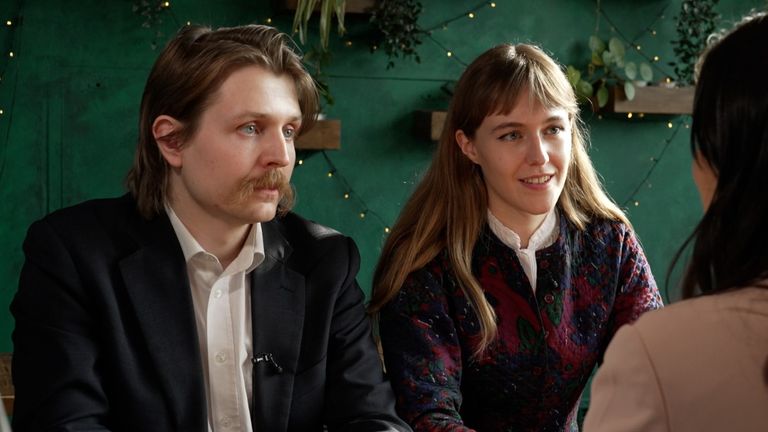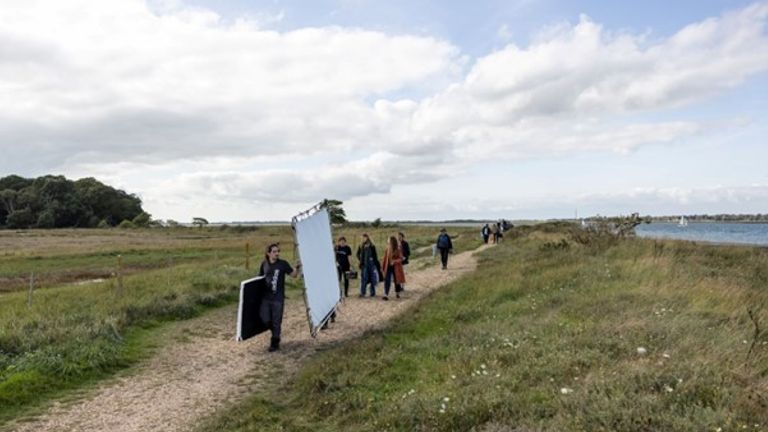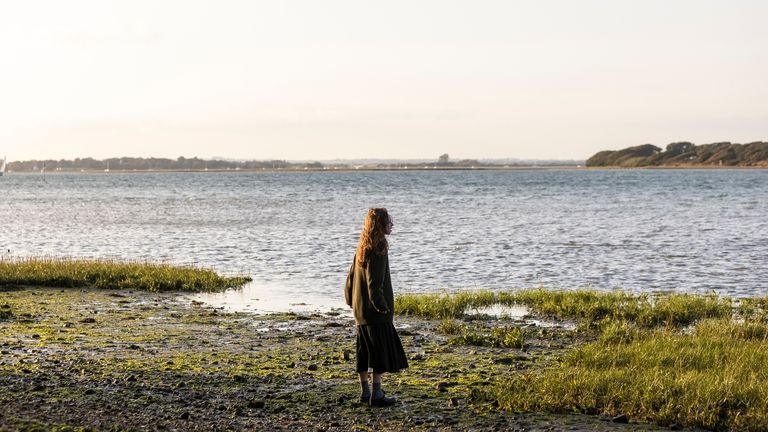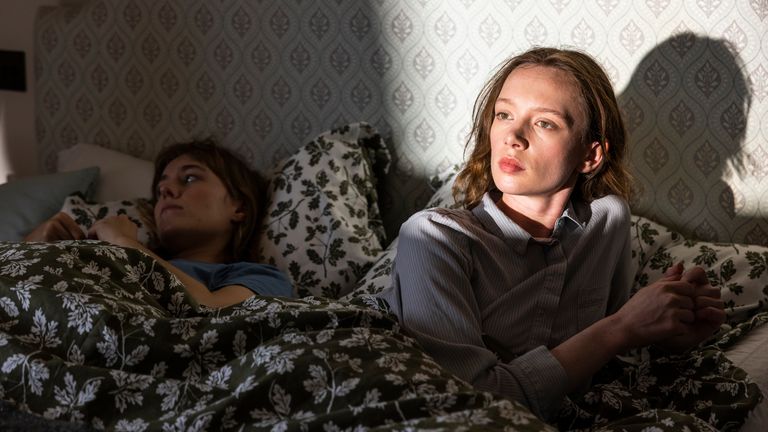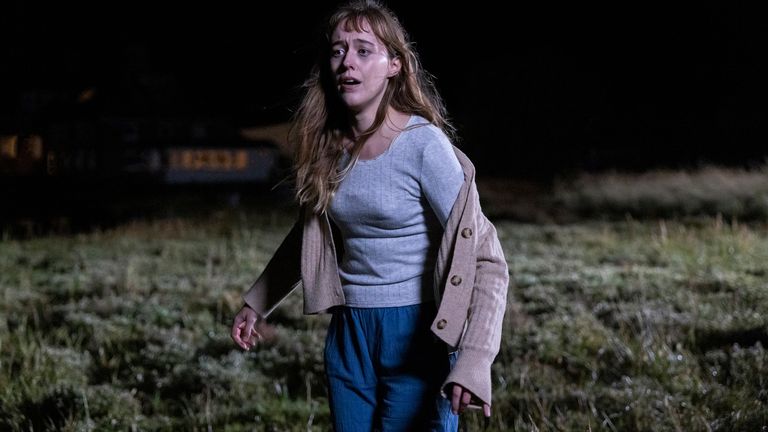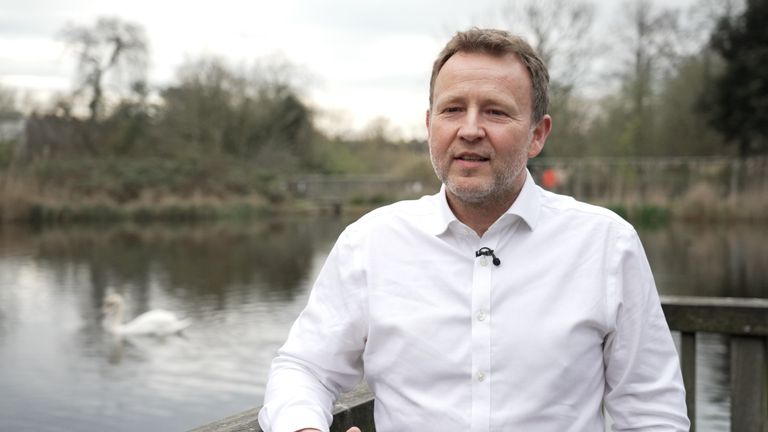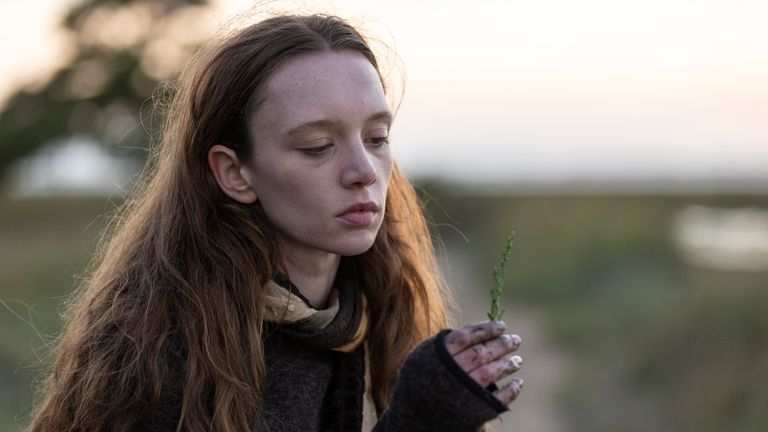Black Samphire: The horror film ‘monstifying’ water pollution to share an urgent warning | Climate News
Black Samphire – an environmental horror about water pollution – premiered at the buzzing Ritzy cinema in Brixton just before World Water Day – but its subject was far from the urban sprawl of south London.
Filmed in West Sussex, the modern-day monster the short film portrays is water pollution and its suffocating effect on Britain’s rivers.
The filmmakers behind the project – Silicon Gothic co-founders Cathy Wippell and Joseph Archer – say it’s a message they felt compelled to shout about.
“Our world faces so many huge, complex, intangible problems out there, and what Silicon Gothic does is we take those problems and ‘monstify’ them, so we make them physical and understandable.”
As rivers around the country are polluted by sewage, caused in part by a changing climate and extreme weather patterns, it offers a timely message.
A keen open-water swimmer, Wippell – who is both the co-star and author of the film – was inspired to write it after stretches of water she was once able to swim in in her home county were closed off due to rising water toxicity levels.
Wippell tells Sky News: “It’s not something that’s really obvious when you look at a river and you don’t really see what’s sort of lurking under the surface. So, to make something like that tangible and like a threat was really important with the story.”
And the production’s eco-credentials ran deeper than just its storyline, with two beach cleans during pre-production to help raise funds and a strict sustainability policy practiced throughout the shoot.
The production company has pledged to carry out at least one climate positive action per film, not only trying to complete a swifter shoot and produce less waste, but proactively trying to fix damage already caused.
All cast and crew were asked to sign a green rider ahead of the shoot, detailing the sustainability measures in place on set and basic conduct measures, including bringing a refillable water container to set and agreeing to separate rubbish.
Pass it on, don’t burn it
All meals available on set were vegetarian or vegan, and in place of plastic-wrapped crisps or cereal bars, over 160 flapjacks were homebaked for the shoot.
In the spirit of a “circular production”, assets from bigger TV and film productions were re-used for the shoot, and after wrapping, items were passed on or donated onwards.
Archer admits items from fast turnaround movies and shows are sometimes burned rather than passed on – a crying shame amid a cost of living crisis and pressing concerns around overconsumption of the world’s resources.
Even the month of the shoot – October – was chosen to ensure that no birds were nesting in the marshes, with priority given to the natural cycle of the marshland, not to the film production.
‘Forget trailer sizes – it doesn’t matter’
Fittingly for a film commenting on the damaging effects of over-consumption of resources, battery-powered generators, rather than traditional gas ones were used as well as LED lights over fluorescent lights in an attempt to be more efficient.
Australian actor Ishtar Currie-Wilson, who stars in the film alongside Wippell, tells Sky News it was a joyful production to work on.
She explains: “The green rider was really refreshing to me, I think because it’s really small, simple, actionable changes. And I think from an individual and like an actor’s perspective, it’s something that we can bring on to all other sets moving forward.”
The First Omen star goes on: “I know on big productions, there are conversations about trailer sizes and things that really don’t matter. But you can make little changes and it feels quite good as an actress to be able to have control over the variables.”
National treasure Stephen Fry
Comparing it to other jobs, Currie-Wilson says: “After being on this project, I went and did reshoots for a bigger project and was completely aware of my, just single use plastics. So, I made sure that I had a keep cup and my water bottle, and I kind of looked into the past of how much waste I personally would use on a set without thinking about it.”
Click to subscribe to ClimateCast wherever you get your podcasts
Another element in the film is actor and comedian Stephen Fry, who voices an unseen character – a less than supportive media boss.
Describing him as an “absolute delight”, Wippell says his involvement “made a massive difference”, with the recognition and gravitas of his voice “really adding something to the film”.
A micro-budget film with big ambitions, the part-crowdfunded project hopes it will set an example to larger studios.
Setting an example to other studios
Wippell explains: “It’s so important to do these things at a smaller indie level because it holds the bigger companies accountable as well for their own sustainability measures on their sets. If we can do it with this amount of money, [they] can do it with millions of pounds.”
Away from its eco-credentials, the 13-minute production uses its short screen time to lay bare the plight of our precious river habitats.
The equivalent of more than 1,270 years of raw sewage has been dumped into Britain’s rivers, lakes and seas since 2016, according to Environment Agency data.
But despite hitting the headlines, both water companies and regulators seem slow to take action.
Campaigning group River Action UK, which partnered with the production, hope those in charge will now sit up and take notice.
‘Delving down into the murky depths’
James Wallace, chief executive of River Action UK, who came on board during production to executive produce the film, says that while they’d previously used animation and short documentary films in their work, this was the campaigning group’s first venture into the world of horror.
He told Sky News: “I couldn’t resist [the film]. It delves down deep into the murky depths of what’s going on in our rivers when it comes to sewage pollution, agricultural pollution, other nasties that lurk in our water.”
He goes on: “It’s going to tell a very powerful story, one that’s going to be really hard to ignore if you’re a politician, if you’re a polluter, or if you’re a member of the public. Hopefully this will really get into the heart of what’s going on in this world.”
But decades of underinvestment in the sewage and water systems, mean it’s an issue no one seems quite ready to deal with head on.
With the clock ticking as dirty water is pumped into seas and rivers, this green tale about dark forces, strives to highlight the potential horror story flowing through our waterways, and the consequences of ignoring the signs.
Watch the full interview on The Climate Show with Tom Heap, Saturday and Sunday at 3.30 and 7.30pm on Sky News.
Black Samphire is now being developed into a full-length feature film. For more info on the project’s progress visit @blacksamphire on Instagram.

